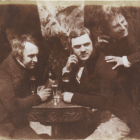Innovators in Literature: Instant Replay, Part 2

For my last ever Ploughshares blog post (double sniff!), I bring you Part 2 of the Innovators in Literature Instant Replay. Many thanks to everyone who contributed to “Innovators in Lit,” read and commented on the interviews, and helped spread the word. After talking to 15 amazing literary innovators, I can’t help but feel that the future of literature is very, very bright.
Innovators in Lit #8, Martin Riker: “I would say Dalkey takes what I call ‘the long view’ of literature…The ‘long view’ idea is simply that you view contemporary literary art as being part of several different conversations concurrently: with the contemporary world, of course, but also with literary history, the countless stylistic and formal traditions that compose the history of literature as an art form, and more generally with the history of human thought and feeling.”
Innovators in Lit #9, Emily Louise Smith: “At Lookout we ask authors to share in our grand experiment: conservative print runs, tailored marketing plans, personalized and thoughtful promotion. We ask them to partner in selling their books, and as I see it, the only fair compensation for faith in our fledgling imprint is to divide profits evenly. It’s unlikely we’ll ever be able to offer a huge advance, though I do wish we could do more, but we’re just not designed to publish on a large scale. It’s not what we do. I’d rather publish a few literary books a year exceedingly well than a dozen commercial titles.”
Innovators in Lit #10, Molly Gaudry: “Maybe we just have to do what we can to generate our own buzz, enough to keep us buzzing, keep us buzzing little bit by little bit. And maybe if we’re really lucky, we can find our way into an existing hive that is making its own buzz, too. And maybe, if we all do our part to help make that hive stronger, help make it bigger and better, well maybe then the big buzz is something we can all hope to share while we go on about being little buzzes alongside all the other little buzzes beside us, all of us buzzing dutifully and proudly together so that one day, who knows, we all made history. Or something. You know?”
Innovators in Lit #11, Tom Roberge: “I do know that with every book we publish, for those who know us, people should be able to hear or read just a little bit about it and think to themselves, ‘Yup, that’s a New Directions book.’”
Innovators in Lit #12, Michele Filgate: “There’s nothing more exciting than hand-selling a book that we’re passionate about, and it’s even more thrilling when it’s a book that’s under the radar and deserves more attention. Indie booksellers have helped turn books into bestsellers. It’s so much better to get a recommendation from a person than from Amazon. Amazon just can’t compete with us when it comes to the personalized hand-sell.”
Innovators in Lit #13, Paul W. Morris: “If the magazine’s early editors ever thought in terms of decades—as opposed to months—the magazine would have never premiered. In fact, the name BOMB is partly inspired by the belief that the magazine would literally bomb after only a few issues. And yet, here we are, against the odds.”
Innovators in Lit #14, Jenna Johnson: “One of the most intriguing and beautiful things about books is how such a solitary activity is really rooted in and generative of communities. Buzz is about recognizing and participating in those communities. Readers, be they authors or members of book clubs or editors or marketing managers or publicists or sales reps or booksellers or librarians or just about anyone, love to talk about books they love. Authors can best create buzz for their books by looking for opportunities to talk about books and creating a connection with readers, as well as creating a sense of where they, themselves, as authors and as readers, fit into a broader literary context.”
Innovators in Lit #15, Richard Nash: “Honestly, I’m not looking for a deus ex machina. Everything we need we actually already have at our disposal. The danger publishing faces right now is in waiting. The tablet will save us, social reading will save us. No. There is no God coming. It’s just a question of creatively, humbly, ambitiously using the tools at our disposal right now.”



